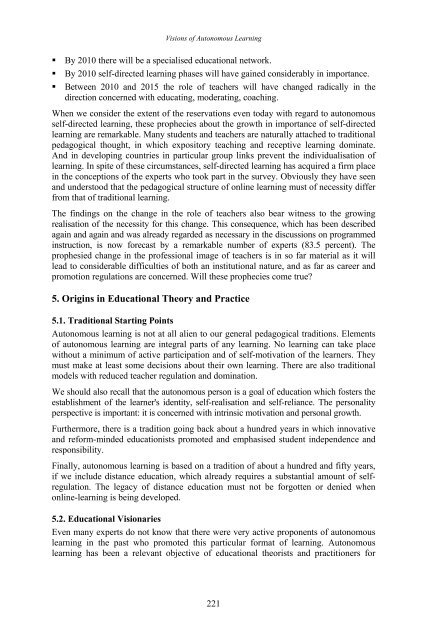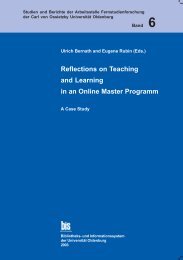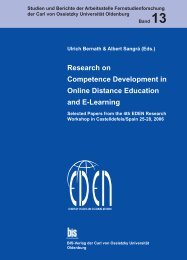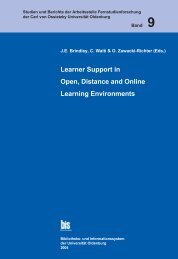Distance Education in Transition - Master of Distance Education ...
Distance Education in Transition - Master of Distance Education ...
Distance Education in Transition - Master of Distance Education ...
You also want an ePaper? Increase the reach of your titles
YUMPU automatically turns print PDFs into web optimized ePapers that Google loves.
Visions <strong>of</strong> Autonomous Learn<strong>in</strong>g<br />
� By 2010 there will be a specialised educational network.<br />
� By 2010 self-directed learn<strong>in</strong>g phases will have ga<strong>in</strong>ed considerably <strong>in</strong> importance.<br />
� Between 2010 and 2015 the role <strong>of</strong> teachers will have changed radically <strong>in</strong> the<br />
direction concerned with educat<strong>in</strong>g, moderat<strong>in</strong>g, coach<strong>in</strong>g.<br />
When we consider the extent <strong>of</strong> the reservations even today with regard to autonomous<br />
self-directed learn<strong>in</strong>g, these prophecies about the growth <strong>in</strong> importance <strong>of</strong> self-directed<br />
learn<strong>in</strong>g are remarkable. Many students and teachers are naturally attached to traditional<br />
pedagogical thought, <strong>in</strong> which expository teach<strong>in</strong>g and receptive learn<strong>in</strong>g dom<strong>in</strong>ate.<br />
And <strong>in</strong> develop<strong>in</strong>g countries <strong>in</strong> particular group l<strong>in</strong>ks prevent the <strong>in</strong>dividualisation <strong>of</strong><br />
learn<strong>in</strong>g. In spite <strong>of</strong> these circumstances, self-directed learn<strong>in</strong>g has acquired a firm place<br />
<strong>in</strong> the conceptions <strong>of</strong> the experts who took part <strong>in</strong> the survey. Obviously they have seen<br />
and understood that the pedagogical structure <strong>of</strong> onl<strong>in</strong>e learn<strong>in</strong>g must <strong>of</strong> necessity differ<br />
from that <strong>of</strong> traditional learn<strong>in</strong>g.<br />
The f<strong>in</strong>d<strong>in</strong>gs on the change <strong>in</strong> the role <strong>of</strong> teachers also bear witness to the grow<strong>in</strong>g<br />
realisation <strong>of</strong> the necessity for this change. This consequence, which has been described<br />
aga<strong>in</strong> and aga<strong>in</strong> and was already regarded as necessary <strong>in</strong> the discussions on programmed<br />
<strong>in</strong>struction, is now forecast by a remarkable number <strong>of</strong> experts (83.5 percent). The<br />
prophesied change <strong>in</strong> the pr<strong>of</strong>essional image <strong>of</strong> teachers is <strong>in</strong> so far material as it will<br />
lead to considerable difficulties <strong>of</strong> both an <strong>in</strong>stitutional nature, and as far as career and<br />
promotion regulations are concerned. Will these prophecies come true?<br />
5. Orig<strong>in</strong>s <strong>in</strong> <strong>Education</strong>al Theory and Practice<br />
5.1. Traditional Start<strong>in</strong>g Po<strong>in</strong>ts<br />
Autonomous learn<strong>in</strong>g is not at all alien to our general pedagogical traditions. Elements<br />
<strong>of</strong> autonomous learn<strong>in</strong>g are <strong>in</strong>tegral parts <strong>of</strong> any learn<strong>in</strong>g. No learn<strong>in</strong>g can take place<br />
without a m<strong>in</strong>imum <strong>of</strong> active participation and <strong>of</strong> self-motivation <strong>of</strong> the learners. They<br />
must make at least some decisions about their own learn<strong>in</strong>g. There are also traditional<br />
models with reduced teacher regulation and dom<strong>in</strong>ation.<br />
We should also recall that the autonomous person is a goal <strong>of</strong> education which fosters the<br />
establishment <strong>of</strong> the learner's identity, self-realisation and self-reliance. The personality<br />
perspective is important: it is concerned with <strong>in</strong>tr<strong>in</strong>sic motivation and personal growth.<br />
Furthermore, there is a tradition go<strong>in</strong>g back about a hundred years <strong>in</strong> which <strong>in</strong>novative<br />
and reform-m<strong>in</strong>ded educationists promoted and emphasised student <strong>in</strong>dependence and<br />
responsibility.<br />
F<strong>in</strong>ally, autonomous learn<strong>in</strong>g is based on a tradition <strong>of</strong> about a hundred and fifty years,<br />
if we <strong>in</strong>clude distance education, which already requires a substantial amount <strong>of</strong> selfregulation.<br />
The legacy <strong>of</strong> distance education must not be forgotten or denied when<br />
onl<strong>in</strong>e-learn<strong>in</strong>g is be<strong>in</strong>g developed.<br />
5.2. <strong>Education</strong>al Visionaries<br />
Even many experts do not know that there were very active proponents <strong>of</strong> autonomous<br />
learn<strong>in</strong>g <strong>in</strong> the past who promoted this particular format <strong>of</strong> learn<strong>in</strong>g. Autonomous<br />
learn<strong>in</strong>g has been a relevant objective <strong>of</strong> educational theorists and practitioners for<br />
221





